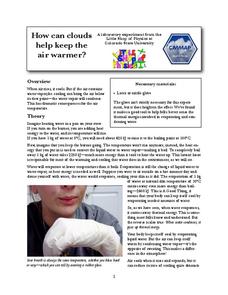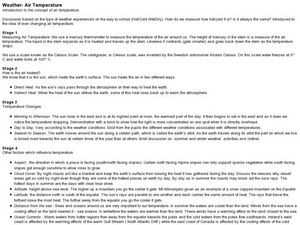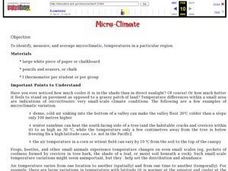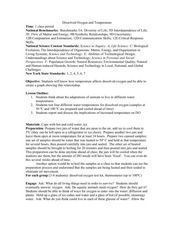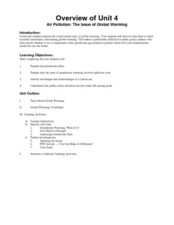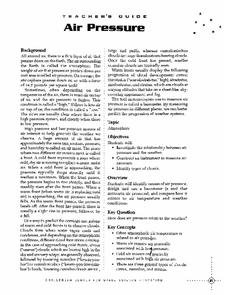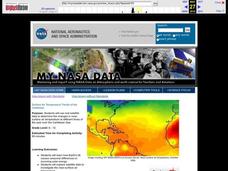Curated OER
Differences Between Ground and Air Temperatures
Young scholars examine the differences between air temperature and ground temperature. In this investigative lesson students find NASA data on the Internet and use it to create a graph.
Colorado State University
How Can Clouds Keep the Air Warmer?
Condensing water warms the air around it. Young scholars consider this concept as they experiment with air temperature around evaporating and condensing water vapor. They simulate the formation of clouds to experience the associated...
Curated OER
Weather-Air Temperature
Students complete activities to learn about changing air temperature. In this air temperature lesson, students study various ways to measure air temperature and learn factors that influence temperature. Students study the weather in a...
Chymist
How Do We Affect the Quality of Our Atmosphere
Explore the makeup of the earth's atmosphere. Using the set of specific experiments, pupils examine the main elements and compounds present in the atmosphere. Their study extends to investigate the effects of atmospheric...
Curated OER
Warm and Cold Air
Students conduct an experiment to discover what happens to air when it is heated or cooled, discover that wind moves from a high-pressure area (an area of sinking air) to a low pressure area (an area of rising air).
Colorado State University
If Hot Air Rises, Why Is it Cold in the Mountains?
Investigate the relationship between temperature and pressure. Learners change the pressure of a sample of air and monitor its temperature. They learn that as air decreases its pressure, its thermal energy converts to kinetic energy.
Curated OER
The Cloud Case
Students discover how clouds form and how air pressure and air temperature affect their formation. The lesson is delivered in the story of Mike Breezy, Air Detective, who tries to solve The Cloud Case.
Curated OER
Micro-Climate
Atmosphere aces investigate the microclimates that exist within a larger area. They use a thermometer to record the varying temperatures and identify the microclimates on a map that they have drawn. This exercise helps them to understand...
Curated OER
Air Pressure & Barometers
Fourth graders observe, measure, and record data on the basic elements of weather over a period of time (i.e., precipitation, air temperature, wind speed and direction, and air pressure). Then, they make a barometer and keep record of...
Curated OER
Dissolved Oxygen and Temperature
Students are shown how temperature affects dissolved oxygen and they create a graph showing this relationship. They think about the adaptations of animals to live in different water temperatures. Students test four different water...
Curated OER
Air Pollution: The Issue of Global Warming
Here is an outstanding 10-page lesson plan on global warming. Learners discover that there is a lot of controversy surrounding this topic in that the science behind global warming is difficult to prove. The best thing about this plan is...
Curated OER
Air Pressure
Students design and use a barometer to study air pressure. In this weather lesson, students identify the causes of air pressure. They design and use a barometer to determine how air pressure relates to air temperature and weather...
Curated OER
A Comparison of Land and Water Temperature
Students examine NASA satellite observations of surface temperature and investigate the seasonal changes of land and water temperature.
Colorado State University
Why Can Warm Air "Hold" More Moisture than Cold Air?—Vapor Pressure Exercise
Does it feel a little humid in here? Learners assume the role of water vapor in the atmosphere as they explore the differences between warm and cold air. They roll dice to determine their level of energy, which determines if they...
Curated OER
Charles' Law
Students determine the validity of Charles' Law. In this Charles' Law lesson plan, students measure the volumes of a gas at two different temperatures. They determine the volume at a high temperature and predict using Charles' Law what...
Curated OER
Turning the Air Upside Down
Students analyze how engineers study temperature inversions and convection currents to understand why pollution levels may be higher in some areas than others. They participate in an experiment that allows them to build simple models to...
Curated OER
Using Vegetation, Precipitation, and Surface Temperature to Study Climate Zones
Students begin their examination of the climate zones found around the world. Using a software program, they identify the relationship between the vegetation, climate and temperatures of the different zones. They also plot coordinates...
Baylor College
Moving Air
In lab groups, young scientists place aluminum cans with a bubble-solution cap into different temperatures of water to see what size of bubble dome forms. As part of an atmosphere unit in preparation for learning about convection...
Curated OER
Surface Air Temperature Trends of the Caribbean
Students investigate the seasonal changes to sea surface and near-surface air temperatures near the equator. They use actual satellite data to track and graph the differences in air and sea temperatures during different seasons in the...
Curated OER
Is Grandpa Right, Were Winters Colder When He Was a Boy?
Students compare current weather data to historic data to see if there is a temperature change. In this weather lesson students complete a lab activity and determine average changes in temperature, precipitation and cloud cover.
Curated OER
Too Heavy For Me
Learners explore the different arrangement of air molecules in high and low air pressure masses. They compare the temperature of high and low pressure masses and discover how a barometer works.
Curated OER
Radiation Comparison Before and After 9-11
Using the NASA website, class members try to determine if changes could be detected in cloud cover, temperature, and/or radiation measurements due to the lack of contrails that resulted from the halt in air traffic after the attacks...
Curated OER
Greenhouse Gases
Although the worksheet for the lab activity is not included, this is an activating activity for your class to do when learning about the greenhouse effect. They lay three thermometers underneath a lamp: one out in the open, one under a...
Curated OER
CO2 and Air Pollution
Seventh graders observe and test for the presence of carbon dioxide gas. They compare concentrations of carbon dioxide gas and conclude high concentrations of carbon dioxide gas are unhealthy for human beings.

